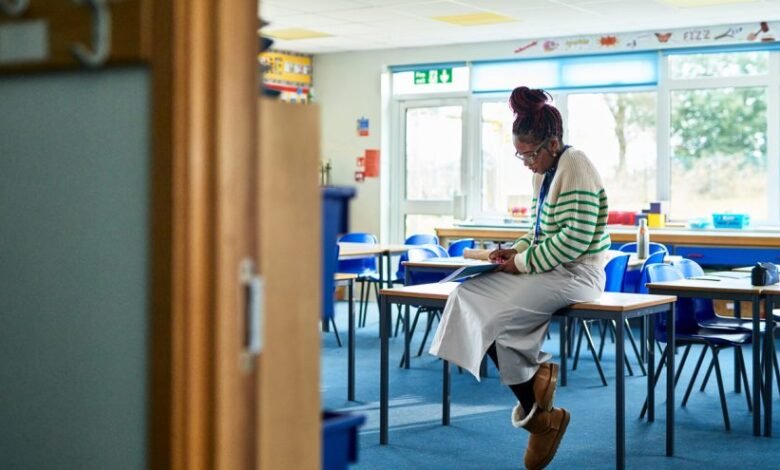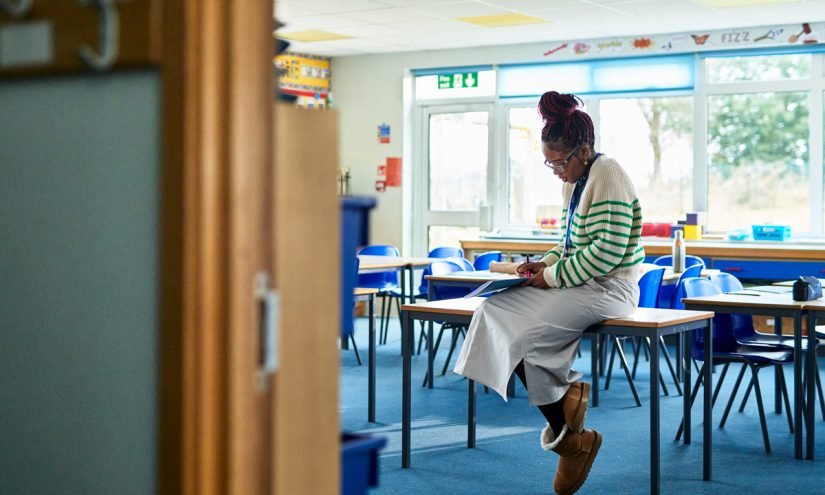Teacher Preparation Isn’t Broken. Our Approach to Policymaking and Advocacy Is – The 74

Teacher Preparation Isn’t Broken. Our Approach to Policymaking and Advocacy Is – The 74
Get stories like this delivered straight to your inbox. Sign up for The 74 Newsletter
This fall, students in more than 400,000 classrooms across the country will be led by long-term substitutes or teachers not fully certified to serve them. As the advocacy community and policymakers ratchet up their agendas to address this egregious disservice to students and families, most debates and opportunities will jump to recruitment bonuses for teachers, fast-track certification programs, or increasing per-pupil funding amounts.
Taken at face-value, these are all admirable efforts to rectify America’s teaching and learning crisis – where students are performing below pre-pandemic levels in all grades and subjects and only 16% of teachers would recommend the profession to future generations of teachers. But if we’re serious about building a strong and sustainable teacher workforce capable of accelerating student learning, we need to step back and ask a more fundamental question: How do we end the revolving door of underqualified teachers working with our students?
This is a question my colleagues and I at Deans for Impact have grappled with over the past decade.
We’ve seen states expand scholarships for aspiring teachers. We’ve seen investments in residency programs that provide longer culminating clinical experiences. We’ve seen calls for better alignment to evidence-based instructional methods. We’ve seen programs mobilize aspiring teachers as tutors. Each of these is important. But too often, the impact is shallow and short-lived.
Scholarships get people into programs but not the right ones. Residency programs remain prohibitively expensive for many. Requirements and accountability to new standards don’t shift practice on their own. Programs worked but were funded by one-time investments without appropriately planning for financial sustainability.
It doesn’t have to be this way.
Through our work with states, educator-preparation programs, and schools nationwide, four conditions rise to the top when designing pathways that deliver:
- Instructionally-focused: Pathways should be aligned to the scientific evidence of how students learn
- Practice-based: Pathways should fully prepare teachers for the broad range of realities of the classroom.
- Accessible: Pathways should be affordable and supportive so that all who aspire to teach can enter and complete quality preparation
- Innovative & Responsive: Pathways must continuously evolve to meet local needs and emerging research.
When taken together, these four conditions can create a holistic system that better prepares teachers, sustains them in the profession, and, most importantly, accelerates outcomes for students. The aim of DFI’s new policy framework is to chart a course of action policy leaders can take to ensure all pathways are affordable and high-quality.
In communities across the country, we are beginning to see efforts that move beyond piecemeal fixes toward more holistic reform efforts that bolster these four conditions.
In Louisiana, the recommendations made and adopted by the statewide Teacher Recruitment, Retention, and Recovery Task Force helped modernize entry into educator-preparation programs, strengthened mentor teacher support, expanded scholarships for aspiring teachers, and built momentum for the state’s first registered teacher apprenticeship program. These policy changes, paired with new investments in high-impact tutoring and a longstanding commitment to ensuring all students access grade-level content, have helped bolster the pipeline of teachers and drive growth in student learning.
In the most recent NAEP resultsLouisiana was one of only two states to surpass pre-pandemic reading performance. It was also one of just a few states to experience an increase in the number of individuals enrolling to become new teachers. Thanks to these new policies, aspiring educators don’t have to find themselves in a situation like Everett Anderson’sa Mississippi college student who chose social work over his dream of becoming a teacher because he couldn’t pass an entry exam.
In Indiana, the University of Notre Dame’s Tutor-ND program trains high-impact tutors, many of whom are on track to become teachers, on principles of cognitive science and equips them to deliver literacy instruction aligned to the state’s new science-of-reading standards. For example, Alliance for Catholic Education Teaching Fellow Sophia Alvarez said she feels much better equipped for the realities of the classroom because of her experience as a Tutor-ND tutor.
These efforts are reinforced by statewide requirements that preparation programs align literacy instruction with research-based approaches, ensuring that aspiring teachers are prepared to deliver rigorous, effective instruction. These mutually reinforcing efforts recently contributed to the state’s largest year-over-year growth in third grade literacy rates on record.
Other states are also leading the way. From HB2 in Texas to strategic staffing in Arizonathese examples of policy and practice working in tandem point the way forward. School communities in Texas will now have flexible funding to prepare talent in quality pathways that address specific workforce needs. Arizona schools are rethinking the role and work of teachers in ways that make teaching more attractive, collaborative and effective. Together, these examples show what happens when we ditch fragmented, one-off investments and embrace building a foundation of what works.
Teacher preparation can no longer be an afterthought. The talent, ideas, and innovations we need are already here. What’s been missing is a system designed to connect them. By focusing on making pathways instructionally focused, practice-based, accessible, innovative and responsive, policymakers and advocates can build and scale pipelines of teachers with the skills needed to ensure every student succeeds.
Get stories like these delivered straight to your inbox. Sign up for The 74 Newsletter
Disclaimer: This news article has been republished exactly as it appeared on its original source, without any modification.
We do not take any responsibility for its content, which remains solely the responsibility of the original publisher.
Author: Patrick Steck
Published on: 2025-09-26 14:30:00
Source: www.the74million.org





